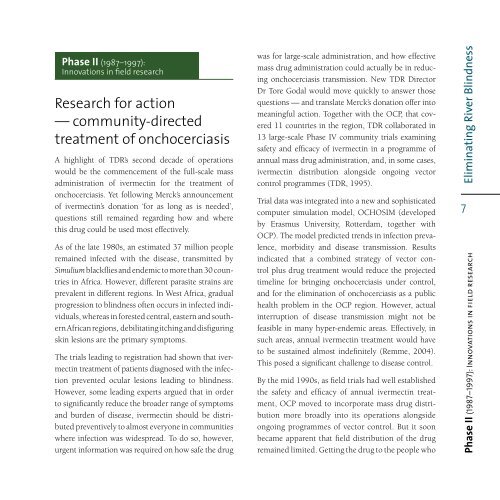Eliminating River Blindness - World Health Organization
Eliminating River Blindness - World Health Organization
Eliminating River Blindness - World Health Organization
Create successful ePaper yourself
Turn your PDF publications into a flip-book with our unique Google optimized e-Paper software.
Phase II (1987–1997):<br />
Innovations in field research<br />
Research for action<br />
— community-directed<br />
treatment of onchocerciasis<br />
A highlight of TDR’s second decade of operations<br />
would be the commencement of the full-scale mass<br />
administration of ivermectin for the treatment of<br />
onchocerciasis. Yet following Merck’s announcement<br />
of ivermectin’s donation ‘for as long as is needed’,<br />
questions still remained regarding how and where<br />
this drug could be used most effectively.<br />
As of the late 1980s, an estimated 37 million people<br />
remained infected with the disease, transmitted by<br />
Simulium blackflies and endemic to more than 30 countries<br />
in Africa. However, different parasite strains are<br />
prevalent in different regions. In West Africa, gradual<br />
progression to blindness often occurs in infected individuals,<br />
whereas in forested central, eastern and southern<br />
African regions, debilitating itching and disfiguring<br />
skin lesions are the primary symptoms.<br />
The trials leading to registration had shown that ivermectin<br />
treatment of patients diagnosed with the infection<br />
prevented ocular lesions leading to blindness.<br />
However, some leading experts argued that in order<br />
to significantly reduce the broader range of symptoms<br />
and burden of disease, ivermectin should be distributed<br />
preventively to almost everyone in communities<br />
where infection was widespread. To do so, however,<br />
urgent information was required on how safe the drug<br />
was for large-scale administration, and how effective<br />
mass drug administration could actually be in reducing<br />
onchocerciasis transmission. New TDR Director<br />
Dr Tore Godal would move quickly to answer those<br />
questions — and translate Merck’s donation offer into<br />
meaningful action. Together with the OCP, that covered<br />
11 countries in the region, TDR collaborated in<br />
13 large-scale Phase IV community trials examining<br />
safety and efficacy of ivermectin in a programme of<br />
annual mass drug administration, and, in some cases,<br />
ivermectin distribution alongside ongoing vector<br />
control programmes (TDR, 1995).<br />
Trial data was integrated into a new and sophisticated<br />
computer simulation model, OCHOSIM (developed<br />
by Erasmus University, Rotterdam, together with<br />
OCP). The model predicted trends in infection prevalence,<br />
morbidity and disease transmission. Results<br />
indicated that a combined strategy of vector control<br />
plus drug treatment would reduce the projected<br />
timeline for bringing onchocerciasis under control,<br />
and for the elimination of onchocerciasis as a public<br />
health problem in the OCP region. However, actual<br />
interruption of disease transmission might not be<br />
feasible in many hyper-endemic areas. Effectively, in<br />
such areas, annual ivermectin treatment would have<br />
to be sustained almost indefinitely (Remme, 2004).<br />
This posed a significant challenge to disease control.<br />
By the mid 1990s, as field trials had well established<br />
the safety and efficacy of annual ivermectin treatment,<br />
OCP moved to incorporate mass drug distribution<br />
more broadly into its operations alongside<br />
ongoing programmes of vector control. But it soon<br />
became apparent that field distribution of the drug<br />
remained limited. Getting the drug to the people who<br />
<strong>Eliminating</strong> <strong>River</strong> <strong>Blindness</strong><br />
7<br />
Phase II (1987–1997): Innovations in field research

















